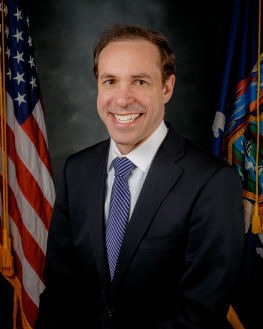Colin Powell School

As the state's chief physician, Dr. Zucker leads initiatives to combat the opioids crisis, strengthen environmental health and end the AIDS epidemic in New York. Since his arrival at the helm of the NYS Department of Health, he has established a network of hospitals equipped to treat Ebola, implemented programs to address the threat of Zika and spearheaded efforts to combat antimicrobial resistance.
Dr. Zucker oversaw the launch of the state's medical marijuana program and continues to update the program to accommodate evolving needs. He also developed numerous campaigns to address major public health issues, including lead contamination, legionella and breast cancer screenings. His extensive review of scientific literature led the state to reject hydrofracking in its borders.
As Commissioner, Dr. Zucker presides over the state's Medicaid program, the New York State Public Health and Health Planning Council, and the Wadsworth Center, New York's premier public health lab. He also oversees the entire health care workforce, as well as health care facilities, including hospitals, long-term care and nursing homes.
In his previous role as first deputy commissioner, Dr. Zucker worked on the state Department of Health's preparedness and response initiatives in natural disasters and emergencies. He collaborated closely with the New York City Department of Health and Mental Hygiene and other health-related entities in the city.
A native of the Bronx, Dr. Zucker earned his M.D. from George Washington University School of Medicine at age 22, becoming one of America's youngest doctors. He is board-certified in six specialties/subspecialties and trained in pediatrics at Johns Hopkins Hospital, anesthesiology at the Hospital of the University of Pennsylvania, pediatric critical care medicine/pediatric anesthesiology at The Children's Hospital of Philadelphia, and pediatric cardiology at Children's Hospital Boston/Harvard Medical School.
Before joining the state Department of Health in September 2013, Dr. Zucker was a professor of clinical anesthesiology at Albert Einstein College of Medicine of Yeshiva University and pediatric cardiac anesthesiologist at Montefiore Medical Center in the Bronx. He was an adjunct professor at Georgetown University Law School, where he taught biosecurity law.
His vast experience in public policy began as a White House Fellow under then-Health and Human Services Secretary Tommy Thompson. Subsequently he became the Deputy Assistant Secretary of Health where he developed the nation's Medical Reserve Corps, which today is run by the U.S. Surgeon General and includes more than 200,000 volunteers across nearly 1000 programs. He also worked on the development of the initial SARS preparedness plan, the anthrax crisis, and the National Institutes of Health autism summit, and led a multidisciplinary team on the issue of tissue engineering/regenerative medicine. Dr. Zucker advanced his public policy experience while serving as an Institute of Politics Resident Fellow at Harvard Kennedy School and later as a Presidential Leadership Scholar.
Dr. Zucker is recognized internationally for his work to advance global health. As senior advisor in the Division of Global Health and Human Rights at Massachusetts General Hospital, he leads a team of experts in developing a community peace index, a research initiative aimed at identifying the effectiveness of peace intervention programs in countries impacted by war, political strife and economic instability.
Previously, he served as Assistant Director-General of the World Health Organization (WHO) in charge of the Health Technology & Pharmaceuticals cluster. In this capacity, Dr. Zucker was the highest ranked American at the WHO and spearheaded efforts to globally combat counterfeit medicines as well as address the interface between intellectual property rights, innovation and public health. He is also a member of the Council on Foreign Relations, Council for Emerging National Security Affairs, and was a "high-level expert" on public health for NATO.
While working on a public-private partnership with an educational technology company, he developed The Afghan Family Health Book, a health literacy project that has educated millions of women in Afghanistan. Dr. Zucker has traveled to China and Haiti on medical missions and spoken extensively throughout the United States on national health policy issues as well as internationally on global health challenges.
Dr. Zucker served as associate professor of clinical pediatrics and anesthesiology at Columbia University College of Physicians & Surgeons and pediatric director of the ICU at New York Presbyterian Hospital, where he launched the restructuring of the critical care complex both from a clinical care delivery standpoint as well as the physical environment. He has held academic appointments at Yale University School of Medicine and the National Institutes of Health, and as a research affiliate in the Center for Space Research at the Massachusetts Institute of Technology.
Dr. Zucker received his B.S. degree from McGill University. As a student at McGill, he helped design zero-gravity medical experiments that ultimately were conducted aboard several Space Shuttle missions. Today, he serves on the Board of Directors of the nongovernmental organization that oversees the U.S. National Lab on the International Space Station.
Dr. Zucker holds a J.D. from Fordham University Law School, a LL.M. from Columbia Law School and a postgraduate diploma from the London School of Hygiene and Tropical Medicine. He holds an honorary Doctor of Science from the Icahn School of Medicine at Mount Sinai and an honorary Doctor of Humane Letters from the Albany College of Pharmacy and Health Sciences. A former ABC World News' Person of the Week and Columbia University Pediatrics Teacher of the Year, Dr. Zucker has been listed in Best Doctors in America as well as Who's Who in the World. He is a member of the medical honor society, Alpha Omega Alpha, and the Bar of the U.S. Supreme Court.